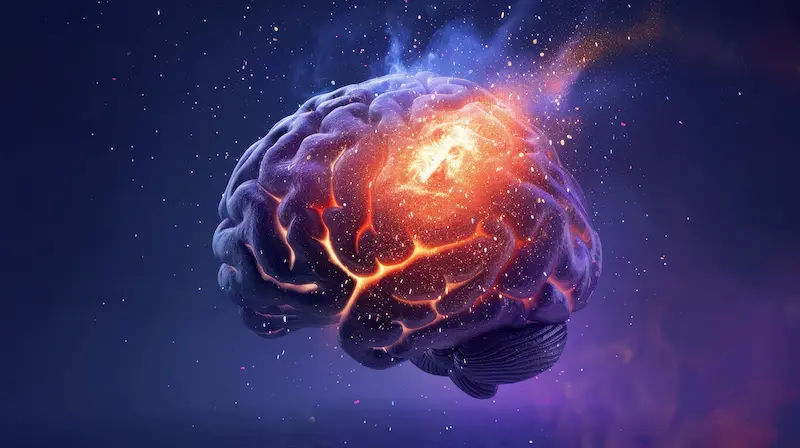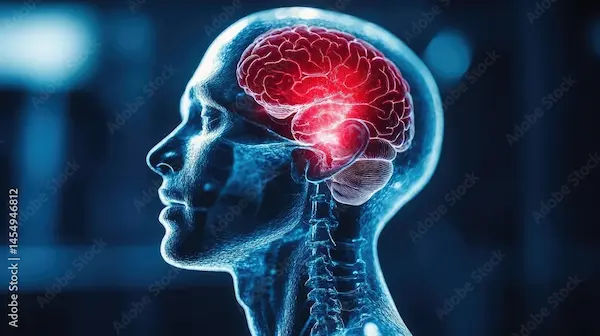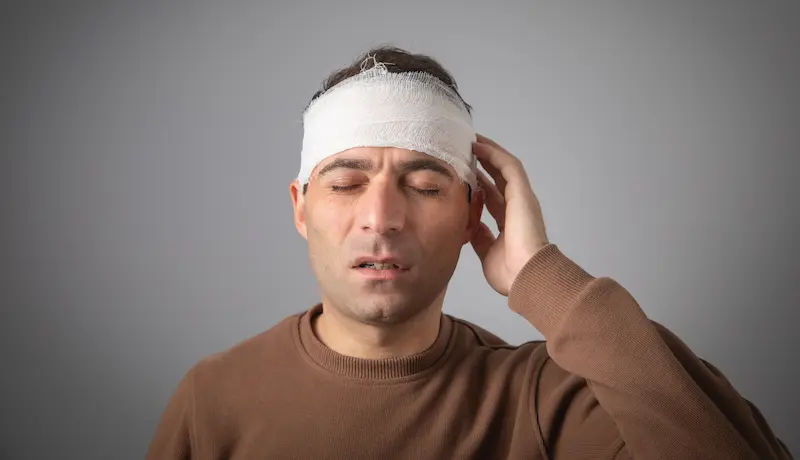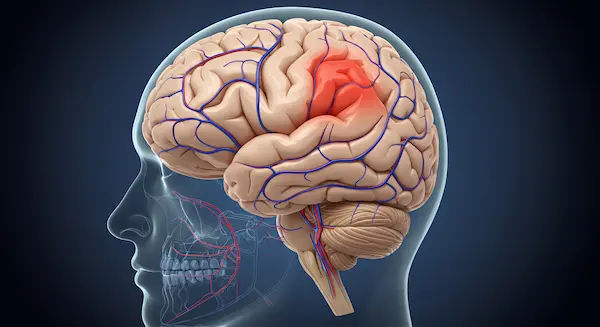Guide to Signs Of Brain Haemorrhage
Learn to recognise the critical signs of a brain haemorrhage. This comprehensive guide covers types, symptoms, causes, risk factors, emergency treatment, and prevention tips to help save lives.

Written by Dr. M L Ezhilarasan
Reviewed by Dr. Dhankecha Mayank Dineshbhai MBBS
Last updated on 13th Jan, 2026

Introduction
A brain haemorrhage is a medical catastrophe. It occurs when a blood vessel in the brain ruptures, causing bleeding into the surrounding tissues. This bleeding kills brain cells, creates pressure inside the skull, and can rapidly lead to unconsciousness or death. Understanding the signs of a brain haemorrhage is not just about knowledge—it's about empowerment. Recognising these critical symptoms can mean the difference between life and death, or between a full recovery and permanent disability. This guide will walk you through everything you need to know: the different types of brain bleeds, the specific symptoms to watch for, the underlying causes, and the immediate steps you must take if you suspect someone is having this emergency. Your awareness could save a life.
Types of Brain Haemorrhage and Their Locations
Not all brain bleeds are the same. They are categorised based on their precise location within the skull, which significantly influences their symptoms and treatment.
Intracerebral Haemorrhage (ICH)
This is the most common type of haemorrhagic stroke. It happens when a blood vessel within the brain itself bursts and leaks blood into the surrounding brain tissue. This directly damages brain cells and increases intracranial pressure. High blood pressure is the leading cause.
Subarachnoid Haemorrhage (SAH)
This bleed occurs in the subarachnoid space, the area between the brain and the thin tissues that cover it. It's often caused by the rupture of a cerebral aneurysm—a weak, bulging spot on a brain artery. A subarachnoid haemorrhage often presents with a sudden, explosive headache.
Subdural Hematoma
This type involves bleeding between the dura (the brain's tough outer layer) and the brain itself. It's usually caused by head trauma, such as in a car accident or a fall, especially in the elderly. The bleeding is typically slower, and symptoms may take days or weeks to appear.
Epidural Hematoma
This is a bleed between the skull and the dura. It is almost always the result of a severe head injury, often involving a skull fracture. It is a medical emergency as bleeding can be rapid and pressure can build quickly.
Consult a Specialist for the best advice
The Critical Signs: Major Symptoms of a Brain Haemorrhage
The symptoms of a brain haemorrhage can vary depending on the location, severity, and amount of brain tissue affected. However, they almost always appear suddenly and worsen rapidly.
Sudden and Severe Neurological Symptoms
These are the most classic and alarming signs that demand immediate action.
The "Thunderclap" Headache
This is often the hallmark symptom, particularly of a subarachnoid haemorrhage. Patients describe it as the "worst headache of my life"—a sudden, severe, and explosive pain unlike any they have ever experienced before.
Seizures Without a Prior History
A sudden onset of seizures in someone with no history of epilepsy can be a major red flag for bleeding in the brain.
Weakness, Numbness, or Paralysis
A sudden loss of strength, numbness, tingling, or paralysis in the face, arm, or leg, typically on one side of the body, is a key sign of a stroke, whether ischaemic or haemorrhagic.
Vision and Sensory Changes
- Sudden blurred, double, or loss of vision.
- Difficulty speaking, slurred speech, or problems understanding speech.
- Loss of balance, coordination, or a sudden dizzy spell.
Cognitive and Behavioural Symptoms
- Sudden confusion, drowsiness, or lethargy.
- Nausea and vomiting, often projectile.
- Loss of consciousness, fainting, or coma.
If you or someone near you experiences any of these sudden symptoms, call for an ambulance immediately. Do not wait to see if they get better. Time is brain.
What Causes a Brain Haemorrhage?
Underlying Health Conditions
- High Blood Pressure (Hypertension): The chronic force of high blood pressure can weaken arterial walls over time, making them prone to rupture.
- Cerebral Aneurysm: A weak spot in a blood vessel wall that balloons and can burst.
- Blood Vessel Abnormalities: Arteriovenous malformations (AVMs) are tangles of faulty blood vessels that can rupture.
- Amyloid Angiopathy: A condition where protein deposits weaken blood vessels in the elderly.
- Blood Disorders: Like hemophilia or sickle cell anaemia, and the use of blood-thinning medications (anticoagulants).
Head Trauma and Injury
This is a leading cause, especially in younger individuals. Any significant blow to the head can cause blood vessels to tear, leading to an epidural or subdural hematoma.
Who is at Risk? Key Risk Factors
Certain factors increase the likelihood of a brain haemorrhage:
- Older age
- High blood pressure
- Smoking
- Excessive alcohol consumption
- Drug abuse, particularly cocaine
- Family history of aneurysms or strokes
How is a Brain Bleed Diagnosed?
In the emergency room, speed is critical. A CT scan (Computed Tomography) is usually the first test performed because it can quickly detect fresh blood in the brain. An MRI (Magnetic Resonance Imaging) may provide more detailed images later. A cerebral angiogram might be used to identify the source of the bleeding, such as an aneurysm or AVM.
Immediate Treatment Options for Brain Bleeding
The primary goals are to stop the bleeding, remove the accumulated blood (if possible), and relieve pressure on the brain. This may involve:
- Emergency medication to control blood pressure, seizures, and intracranial pressure.
- Surgical intervention: A craniotomy (opening the skull) may be needed to repair blood vessels, clip an aneurysm, or remove a hematoma.
The aftermath of a brain bleed can involve a long recovery with rehabilitation for physical, occupational, and speech therapy. If your condition does not improve after trying these methods, book a physical visit to a doctor with Apollo24|7 for further evaluation and management of risk factors.
Can You Prevent a Brain Haemorrhage?
While not all brain haemorrhages are preventable, you can significantly reduce your risk by:
- Controlling high blood pressure.
- Not smoking.
- Managing stress.
- Wearing a seatbelt and helmet to prevent head trauma.
- Drinking alcohol in moderation.
Apollo24|7 offers convenient home collection for tests like blood pressure monitoring and cholesterol panels to help you manage these risk factors proactively.
Conclusion: Act Fast, Save a Life
A brain haemorrhage is a race against time. The symptoms are often dramatic and unmistakable—the sudden, worst headache of your life, a collapse, or one-sided weakness. There is no room for a "wait-and-see" approach. This article has armed you with the knowledge to recognise these critical signs of brain bleeding. If you witness them, your immediate action is the most crucial factor. Call emergency services without delay. Your swift response gives medical professionals the best chance to intervene, potentially saving a life and preserving brain function for a better recovery. Stay vigilant, manage your health risks, and trust your instincts in an emergency.
Consult a Specialist for the best advice
Consult a Specialist for the best advice

Dr. Uddalak Chakraborty
Neurologist
8 Years • MBBS,MD(GENL. MED.),DM(NEUROLOGY)
Kolkata
VDC Clinic, Kolkata
(25+ Patients)

Dr. Uddalak Chakraborty
Neurologist
8 Years • MBBS, MD(GENL.MED.),DM(NEUROLOGY)
Kolkata
MCR SUPER SPECIALITY POLY CLINIC & PATHOLOGY, Kolkata

Dr. Ganeshgouda Majigoudra
Neurologist
10 Years • MBBS, MD ( GENERAL MEDICINE) DM (NEUROLOGY)
Bengaluru
Apollo Clinic, JP nagar, Bengaluru

Dr. Aditendraditya Singh Bhati
Neurosurgeon
21 Years • MBBS(2004), DNB Neurosurgery(2014); MNAMS; Fellow Skull Base Endoscopy (Italy), Fellow Extended Skull Base ( Weill Cornell, USA), Fellow ZAP-X Radiosurgery. Member of American Association of Neurological Surgeons
Delhi
Apollo Hospitals Indraprastha, Delhi
(100+ Patients)

Dr. Avinash Goswami
Neurologist
11 Years • MBBS, DNB (Medicine), Dr.NB (Neurology), MNAMS
Delhi
Apollo Hospitals Indraprastha, Delhi
Consult a Specialist for the best advice

Dr. Uddalak Chakraborty
Neurologist
8 Years • MBBS,MD(GENL. MED.),DM(NEUROLOGY)
Kolkata
VDC Clinic, Kolkata
(25+ Patients)

Dr. Uddalak Chakraborty
Neurologist
8 Years • MBBS, MD(GENL.MED.),DM(NEUROLOGY)
Kolkata
MCR SUPER SPECIALITY POLY CLINIC & PATHOLOGY, Kolkata

Dr. Ganeshgouda Majigoudra
Neurologist
10 Years • MBBS, MD ( GENERAL MEDICINE) DM (NEUROLOGY)
Bengaluru
Apollo Clinic, JP nagar, Bengaluru

Dr. Aditendraditya Singh Bhati
Neurosurgeon
21 Years • MBBS(2004), DNB Neurosurgery(2014); MNAMS; Fellow Skull Base Endoscopy (Italy), Fellow Extended Skull Base ( Weill Cornell, USA), Fellow ZAP-X Radiosurgery. Member of American Association of Neurological Surgeons
Delhi
Apollo Hospitals Indraprastha, Delhi
(100+ Patients)

Dr. Avinash Goswami
Neurologist
11 Years • MBBS, DNB (Medicine), Dr.NB (Neurology), MNAMS
Delhi
Apollo Hospitals Indraprastha, Delhi
More articles from Brain Injury
Frequently Asked Questions
Can you have a small brain haemorrhage and not know it?
Yes, it's possible, though less common. A very small bleed might cause minor symptoms like a lingering headache or slight dizziness that is often mistaken for something else. However, any bleed is serious and should be evaluated.
What is the difference between a stroke and a brain haemorrhage?
A stroke is an umbrella term for a disruption of blood flow to the brain. An ischaemic stroke is caused by a clot blocking a vessel. A haemorrhagic stroke (a brain haemorrhage) is caused by a burst vessel bleeding into the brain. Both are emergencies.
How long can you live with a brain haemorrhage?
Survival depends on the size, location, and speed of treatment. Some patients make a full recovery, while others may have permanent disabilities. Rapid medical intervention is the biggest factor in improving survival rates and outcomes.
What are the first signs of a brain bleed after a head injury?
After a head injury, be extremely cautious. The first signs can be a worsening headache, confusion, drowsiness, nausea, vomiting, slurred speech, or one pupil becoming larger than the other. Seek immediate medical attention for any significant head trauma.
Can stress cause a brain haemorrhage?
Stress itself does not directly cause a bleed. However, acute stress can cause a sudden spike in blood pressure, which could potentially trigger the rupture of an already weakened blood vessel or aneurysm.




